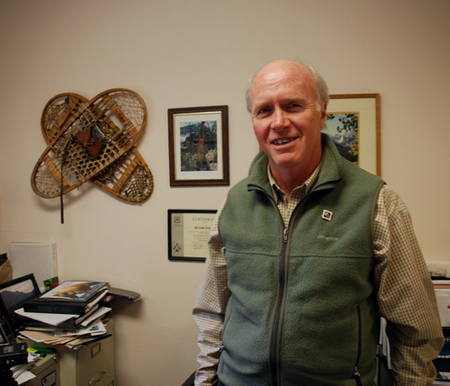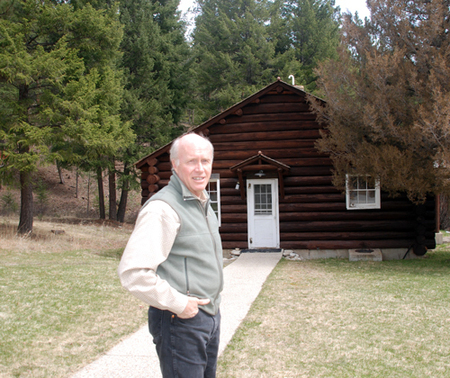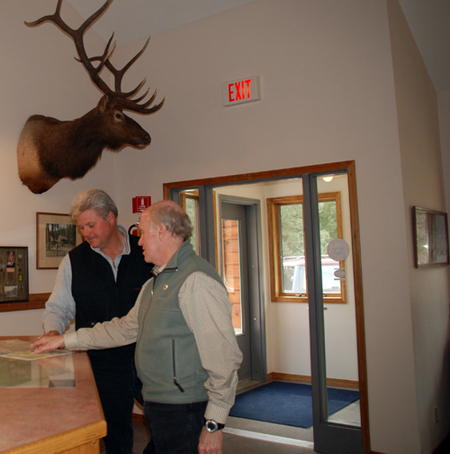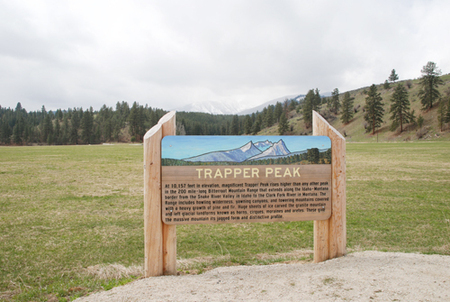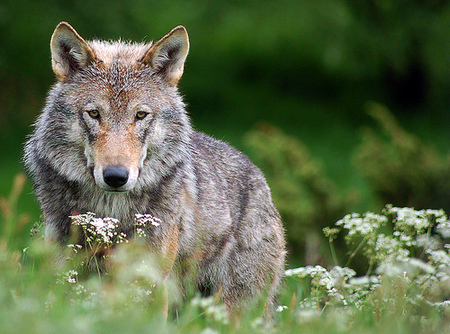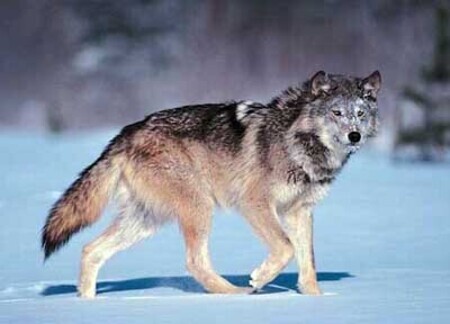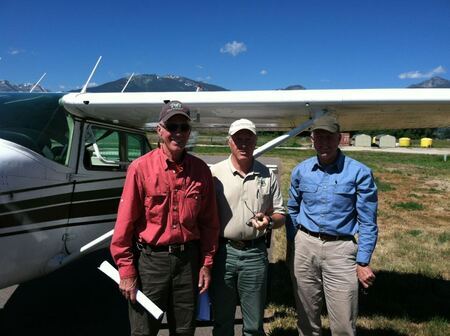Episode 27 : Wild Wolf Howl : an interview with Dave Campbell Item Info
In this episode, titled “Wild Wolf Howl,” we hear from Dave Campbell, who serves as the Wilderness Ranger at the West Fork Ranger District. [Correction: Dave is the District Ranger responsible for Wilderness.]
Dave grew up in Colorado with a family that enjoyed the out-of-doors. He tells the story of a family backpack trip into the Raywah Wilderness in Colorado when he was a child, and a wilderness ranger came into the camp with a mule, a little burro. As Dave tells it, he was astonished that someone actually got paid to do that. At that point, Dave knew what he wanted to do, and he pursued a career in the outdoors, first at Colorado State with a major in wildlife, and then ending up in Forestry and Recreation. He first worked in planning, became certified as a Siviculturist, and later worked in the Line Officer position as a Ranger, first as an Acting Ranger on the Okanogan in Washington, where he dealt with his first wilderness issues. He moved to the Anaconda-Pintler where he served as a Ranger and began work on organizing a Wilderness Center of Excellence at the West Fork Ranger district. In 1997, Dave moved to the ranger position at West Fork, where he currently serves.
Dave discussed administrative problems in a wilderness that crosses the Idaho-Montana state line, the inspiration he drew from Aldo Leopold’s A Sand County Almanac, and his determination to protect the pristine Selway River. Here, he discusses the reintroduction of the Gray Wolves from Canada into the wilderness, and the controversy surrounding them.
Episode 27 : Wild Wolf Howl : an interview with Dave Campbell [transcript]
00:00:00:00 - 00:00:29:15 Debbie Lee: Welcome to the Subway Bitterroot Wilderness History Project, which is made possible by a grant from the National Endowment for the Humanities. The University of Idaho, and Washington State University. Part of the project’s mission is to collect, preserve, and make public oral histories documenting the history and people of the subway. Bitterroot wilderness. For more information, please visit our website at SPW lib argue idaho.edu.
00:00:29:17 - 00:00:54:15 Debbie Lee: And then I think people, I think people get so much out of being in a wilderness setting once you take away cars and money and telephones, people are different and they are different to each other, I think. and and then they draw on things in themselves that maybe are a little rusty from our crazy life out here.
00:00:54:15 - 00:01:25:15 Debbie Lee: Now, I think the ways that people get along when they’re isolated in a place like that, that they place that they want to be, are really it’s a wonderful thing.
00:01:25:18 - 00:01:50:00 Debbie Lee: Thank you for joining us for the 27th episode of the Selway Bitterroot Wilderness History Project. In this episode, titled Wild Wolf Howl, we hear from Dave Campbell, who serves as a wilderness ranger at the West Fork Ranger District. Dave grew up in Colorado with a family that enjoyed the out-of-doors. He tells the story of a family backpack trip into the real wilderness in Colorado.
00:01:50:00 - 00:02:11:12 Debbie Lee: When he was a child and a wilderness ranger came into the camp with a mule, a little burro. As Dave tells it, he was astonished that someone actually got paid to do that. At that point, Dave knew what he wanted to do and he pursued a career in the outdoors. First at Colorado State with a major in wildlife and then ending up in forestry and recreation.
00:02:11:14 - 00:02:36:01 Debbie Lee: He first worked in planning, became certified as civil cultures, and later worked in the line officer position as a ranger, first as an acting ranger on the Okanagan in Washington, where he dealt with his first wilderness issues. He moved to the Anaconda Pinto, where he served as a ranger and began work on organizing a Wilderness Center of Excellence at the West Fork Ranger District in 1997.
00:02:36:03 - 00:03:03:09 Debbie Lee: Dave moved to the Ranger position at West Fork, where he currently serves. Dave discussed administrative problems in a wilderness that crosses the Idaho Montana state line. The inspiration he drew from Aldo Leopold, a Sand County Almanac and his determination to protect the pristine Selway River. Here, he discusses the reintroduction of the gray wolves from Canada into the wilderness and the controversy surrounding them.
00:03:03:11 - 00:03:08:06 Dave Campbell: Yeah, Wolf, reintroduction, of course, is hugely controversial in this part of the world.
00:03:08:12 - 00:03:18:00 Debbie Lee: Would you mind talking a little bit about, the reintroduction of wolves and how it came about and what the controversy is right now?
00:03:18:00 - 00:03:39:03 Dave Campbell: Oh, sure. You know, I’m by no means the expert, right? I’ve been, been, you know, since it is, Fish and Wildlife Service action where we cooperate with. But luckily we’re not. We the Forest Service aren’t in the driver’s seat, but it was, in, I guess it was nine, trying to think it was probably 95.
00:03:39:03 - 00:04:04:25 Dave Campbell: I think when they the decision was made to reintroduce wolves in Yellowstone in central Idaho and, so they did. And those my, feeling as they’ve been wildly successful wolves reproduce much better than grizzly bears. They have litters that, pair and they, they have very high reproductive rate. And so they, you really have, have done very well.
00:04:04:28 - 00:04:30:09 Dave Campbell: And both in Idaho, central Idaho release and in the Yellowstone release. And it’s been fascinating to watch the relationship of people to this iconic figure, if you will. And wilderness. I mean, this is a yeah, that’s the the pin from the with the 30th anniversary of the wilderness Act as a howling wolf with the moon. And I were this been a lot and, so people said, trying to generate controversy.
00:04:30:14 - 00:04:58:20 Dave Campbell: Talk it out for us. Is it it. I just like the pen, and what it signifies, you know, I mean, there’s a lot of symbolism behind wolves going back to all the Leopold and stuff to like the mountain. So anyways, it’s been very successful and it’s caused a lot of tension as anybody that’s been around and not buried their head in the sand knows, it’s, just last week, Congress undertook for the first time, I believe, the papers.
00:04:58:20 - 00:05:25:02 Dave Campbell: I and I think it’s probably true the first time to to legislatively remove a species from the Endangered Species Act through an act of Congress in Idaho, in Montana, with, I think Mike Simpson in Idaho and Jon Tester in Montana combined to remove. They said, okay, we’re going to settle this question of wolves in Idaho. Montana, of course, Wyoming is still their own special case.
00:05:25:05 - 00:05:50:24 Dave Campbell: but it’s really what’s interesting to me about it is and what’s fascinating about wilderness management is it’s it’s a lot about people’s perceptions, perspectives, people’s perceptions of what wilderness is or ought to be, what they think it is, and what they hold dear. You know, in, in the wilderness, whatever it is. And wolves are perfect symbol of that because, you know, guess what?
00:05:50:24 - 00:06:18:26 Dave Campbell: You know, they they do eat elk. And so they’re, you’re competitor. We’re competing predators, but they do howl. And that’s it’s a very wild sound. And you hear that, you know, it’s like in the northern, Minnesota. The little the sign of the loon is that crazy, wild sound. And I think that’s true here. It’s, you know, if you’re way back in the woods and hearing a the wolf howl, it’s like being in Africa and hearing a lion roar in distance.
00:06:19:02 - 00:06:51:29 Dave Campbell: So it’s it’s an iconic kind of thing. And I think that so it’s separated people into these camps, although there is some overlap. But in many, many people just think, you know, they’re back to before, you know, they’re not thinking like them out and thinking, we got to get rid of the elk, gotten rid of the wolves because of we’re else, you know, and instead of thinking in the holistic, functioning ecosystem, kind of approach, which I prefer personally, you know, wolves are a part of the system.
00:06:51:29 - 00:07:20:21 Dave Campbell: It’s an incomplete system without them. yeah, sure we can we can have lots of debates about how many, but it doesn’t seem to make sense to call this a complete and functioning system when you’ve removed some of the keystone pieces of it. So and that’s a challenge, Willis. Then. And the other challenges, the outside influences, you know, acid rain, is a huge in some of this is a big issue.
00:07:20:22 - 00:07:48:22 Dave Campbell: And in the same way, our biggest issue is invasive plants, not just weeds. So the wolf issue, I think just really is, you know, it’s almost a sociological study as well as a biological one. Yeah. It’s pretty hard not to say wolves are recovered. personally, I don’t think we’ll ever be Wolves will ever be gone unless they some decided to go back to poisoning and trapping, which I really would be surprised to see that happen.
00:07:48:26 - 00:07:50:03 Debbie Lee: Now that they used to do.
00:07:50:03 - 00:08:13:23 Dave Campbell: That. Oh, yeah. That’s the only way I think the wolves were eliminated from from the West was by a combination of everything wolf pelts, you know, cyanide, you know, pellets. And, you know, I don’t I can’t bear what kind of poisoning, but they used everything available to kill every wolf on site is the only way that they ever got rid of them.
00:08:13:26 - 00:08:38:00 Dave Campbell: And so I, I don’t see society having that tolerance for that kind of level of, of, eradication. So they’ll be here and that’s, and that’s caused, complications when you start talking about other charismatic megafauna like grizzly bears, because nobody in their right mind politically is going to come in and say, well, now that we’ve succeeded with wolves, are you talking about grizzly bears?
00:08:38:00 - 00:09:16:28 Dave Campbell: Not right now. Because this weight of ethic is this is really so bears will probably show up on their own and be my guess, and we’ll deal with them under the full protection of the USA when they do. And that’ll be another interesting wilderness challenge. You know, I think that, you know, because it does and the the wonderful thing about, managing a wilderness or at least one of the things from managers is it does afford more of a, a manager with more of an idealistic, you can you can operate on your ideals a little more than you might in forest management or range management or some of that.
00:09:17:01 - 00:09:40:26 Dave Campbell: There’s this, you know, the Wilderness Act. It’s not like most other acts, you know, it doesn’t, you know, there’s a lot more poetry, a lot more, value and emotion in it than others. So it’s pretty, you know, it’s a privilege. I mean, the two huge wildernesses here in Florida, both of them.
00:09:40:29 - 00:10:07:29 Debbie Lee: Thank you for joining us for this episode of the Selway Bitterroot Wilderness History Project, which has been made possible by the National Endowment for the Humanities, the University of Idaho, and Washington State University. The project coordinator is Debbie Lee, recorded and produced by Aaron Jepson.
Gallery
- Title:
- Episode 27 : Wild Wolf Howl : an interview with Dave Campbell
- Creator:
- Debbie Lee; Campbell, Dave
- Date Created (ISO Standard):
- 2011-04-18
- Description:
- Interviewee: Dave Campbell | Interviewer: Debbie Lee | Location: West Fork Ranger Station, south of Darby, Montana | Date: April 18, 2011 | In this episode, titled 'Wild Wolf Howl,' we hear from Dave Campbell, who serves as the Wilderness Ranger at the West Fork Ranger District. [Correction: Dave is the District Ranger responsible for Wilderness.]
- Subjects:
- podcasts conservation forest rangers wilderness personal recollections wildlife
- Section:
- Wilderness Voices
- Location:
- Selway-Bitterroot Wilderness (Idaho and Mont.)
- Publisher:
- Wilderness Voices, The Selway-Bitteroot Wilderness History Project, https://selwaybitterrootproject.wordpress.com/
- Original URL:
- https://selwaybitterrootproject.wordpress.com/2012/08/20/wild-wolf-howl/
- Source Identifier:
- Selway-Podcast-ep27
- Type:
- Sound
- Format:
- audio/mp3
- Language:
- eng
- Preferred Citation:
- "Episode 27 : Wild Wolf Howl : an interview with Dave Campbell", The Selway-Bitterroot Wilderness History Project, University of Idaho Library Digital Collections, https://www.lib.uidaho.edu/digital/sbw/items/sbw309.html
- Rights:
- Copyright: The Selway-Bitteroot Wilderness History Project. In Copyright - Educational Use Permitted. For more information, please contact University of Idaho Library Special Collections and Archives Department at libspec@uidaho.edu.
- Standardized Rights:
- http://rightsstatements.org/vocab/InC-EDU/1.0/

